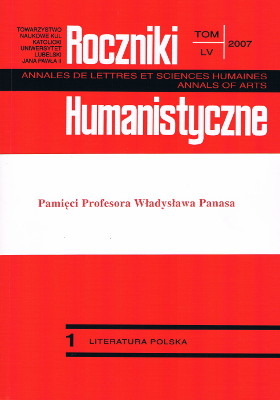W stronę „kultury znaczenia”. O Władysława Panasa teorii interpretacji
Abstrakt
Władysław Panas’s art of interpretation is closely connected with his theory of inter- pretation that he developed referring to Yuri Lotman’s views on semiotics. All his work as well as his research attitude look to „culture of meaning” that is juxtaposed, on the one hand to the scientistic structuralism, and on the other to the skepticism dominating the contemporary study of literature. In his theory of interpretation Panas justifies the importance of the personal dimension. „Personal speech” predisposed to expressing individuality is a constant motivating power shaping literary communication opposed to the power aiming at social understanding. „Personal speech” introduces the factor of „non-understanding” into the communication system, and by this fact it constitutes its interpretative „ambivalence” resulting from inexpressibility of what is individual (person) in what is common (system). The meaning of a literary work turns out to be transcendental in two ways: towards „structure” and towards „person”. Interpretation consists in re-coding „structural meanings” into „personal speech” according to the rules that Panas, following Konorozov’s conceptions, calls „rules of fascination”. Panas’s theory of interpretation, putting „personal speech” in the center, tends towards personalism and anthropology. The Messianic meaning found by Panas in the works by Bruno Schulz is a personal meaning in the highest degree. Traditions of teurgical hermeneutics (P. Florenski) and the mystic Jewish hermeneutics (cabbala) become an important element of his theory of interpretation. Reconstruction of „culture of meaning” seems impossible without referring to those traditions that formed this culture.
Copyright (c) 2007 Roczniki Humanistyczne

Utwór dostępny jest na licencji Creative Commons Uznanie autorstwa – Użycie niekomercyjne – Bez utworów zależnych 4.0 Międzynarodowe.





